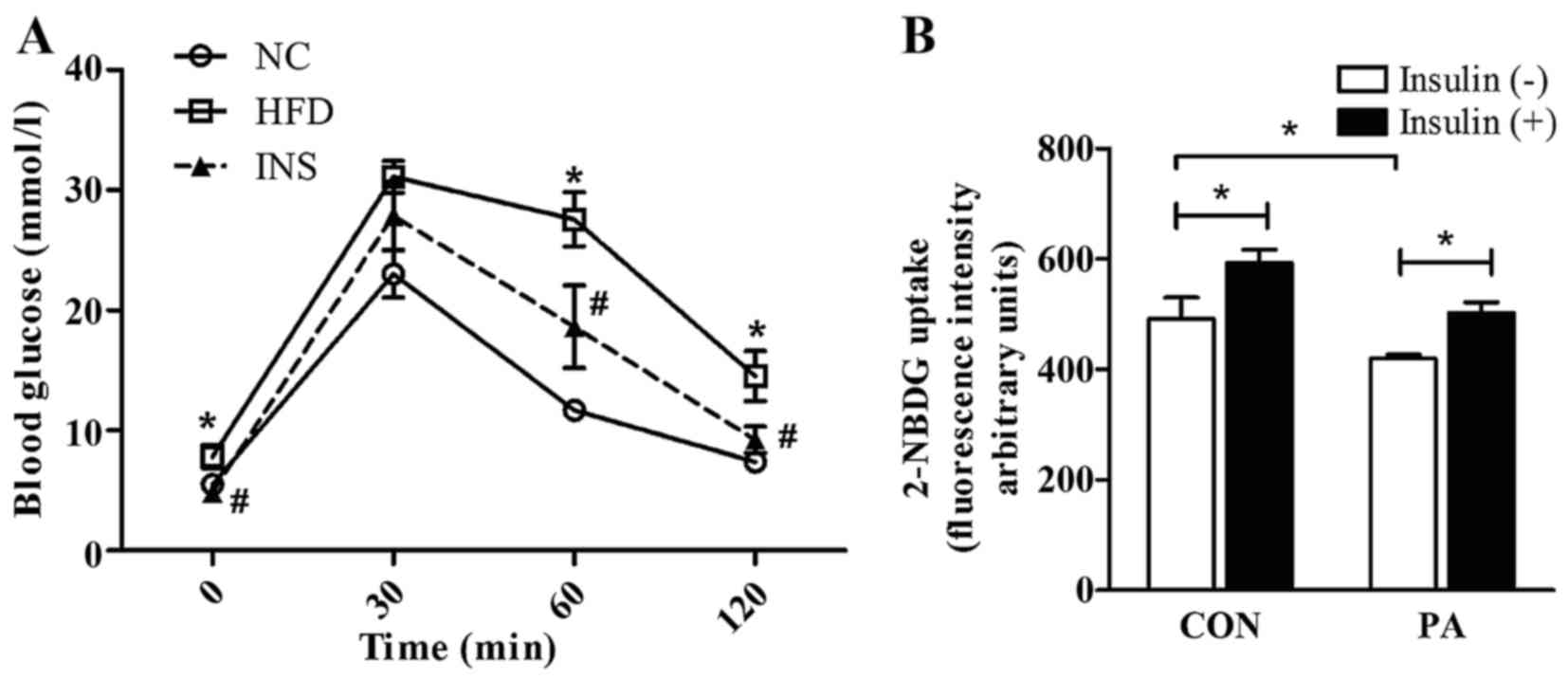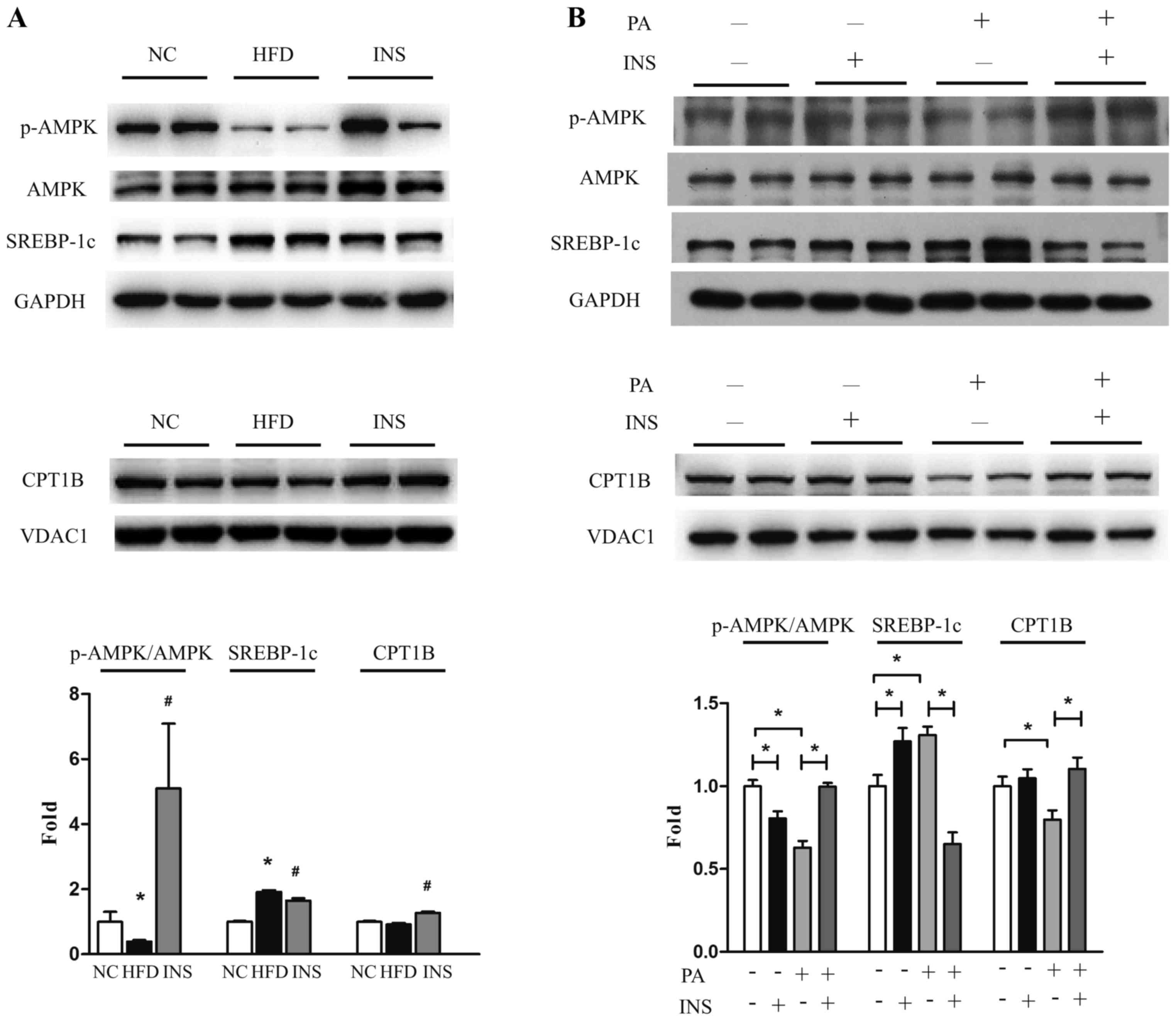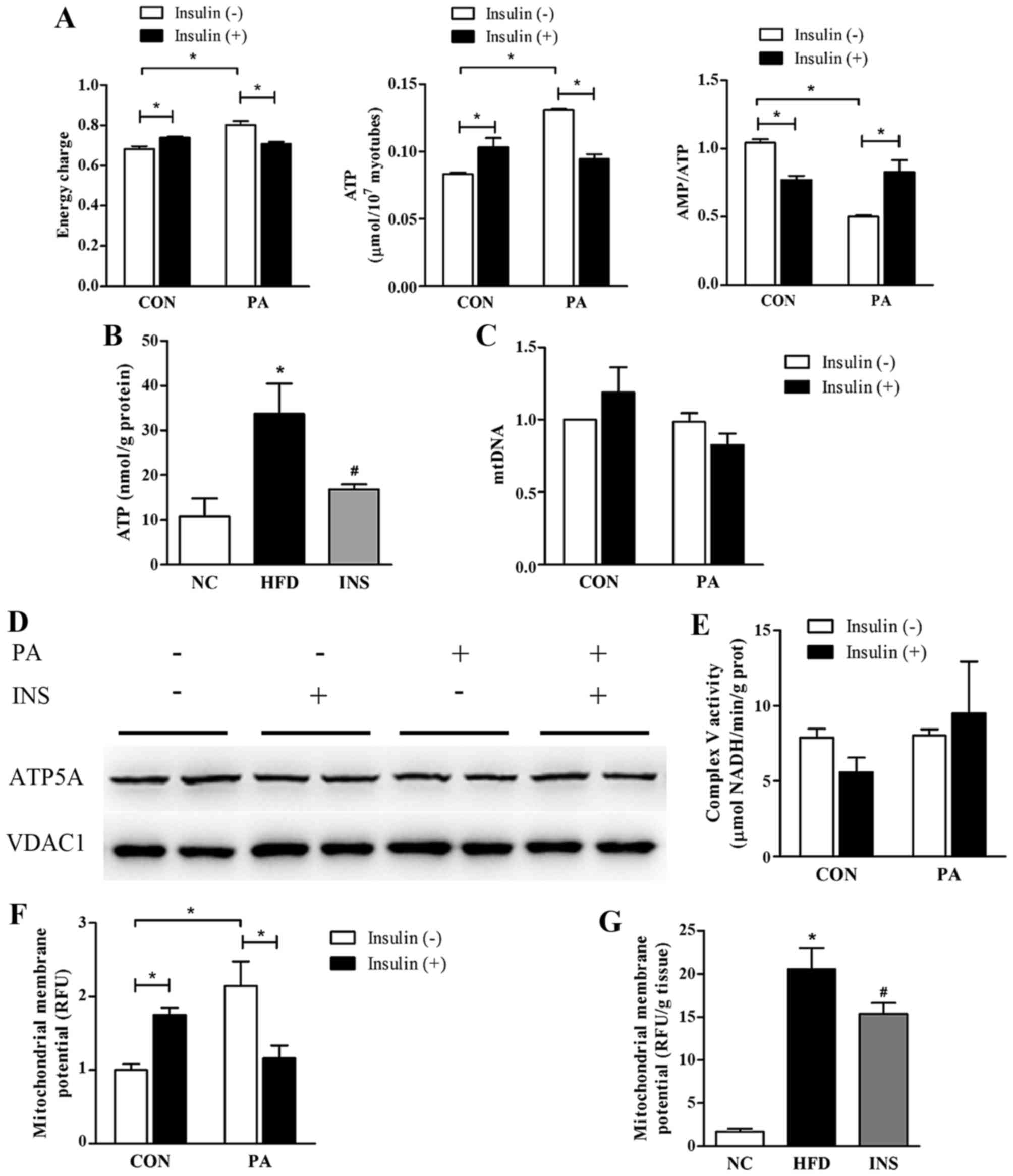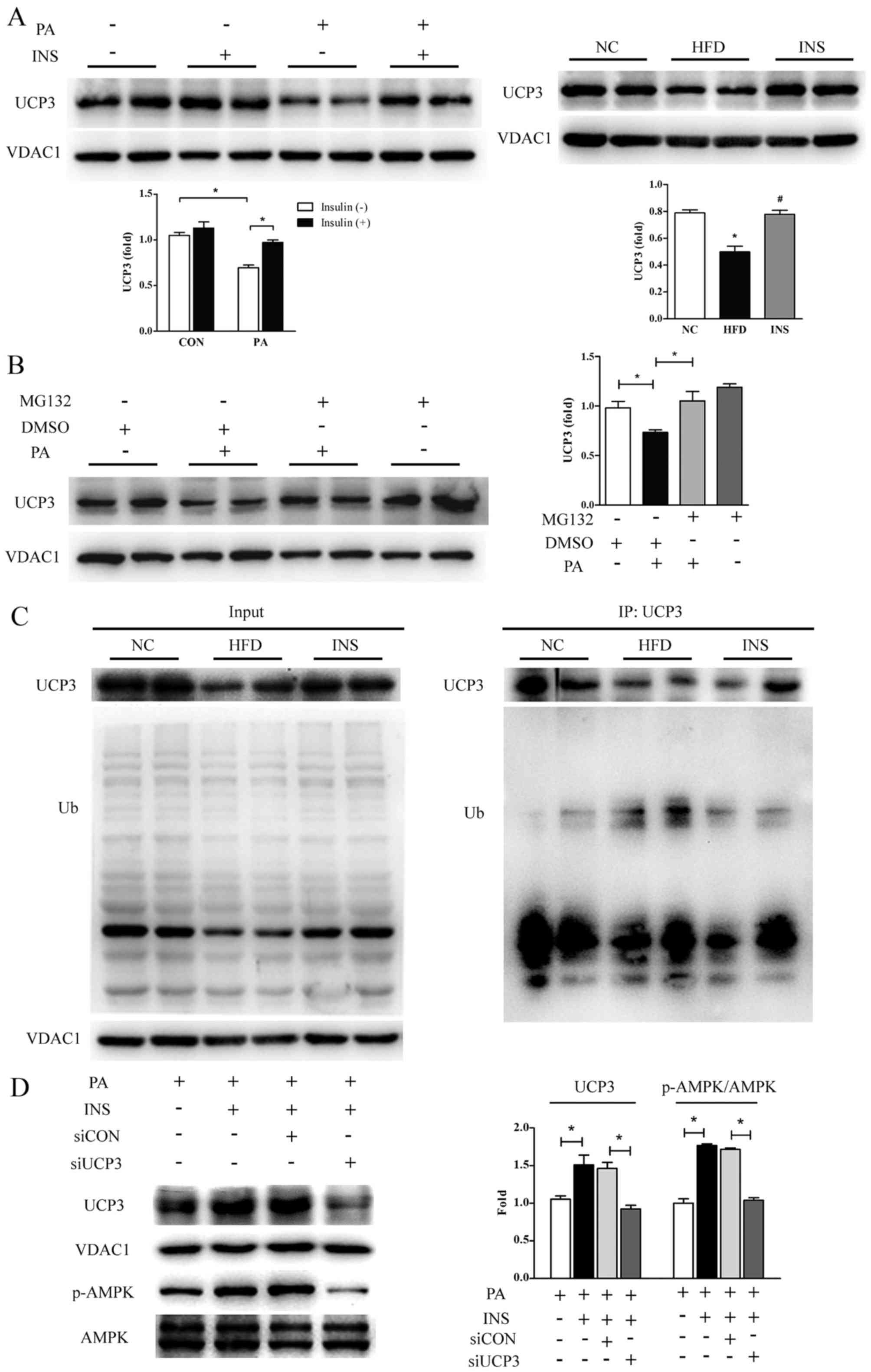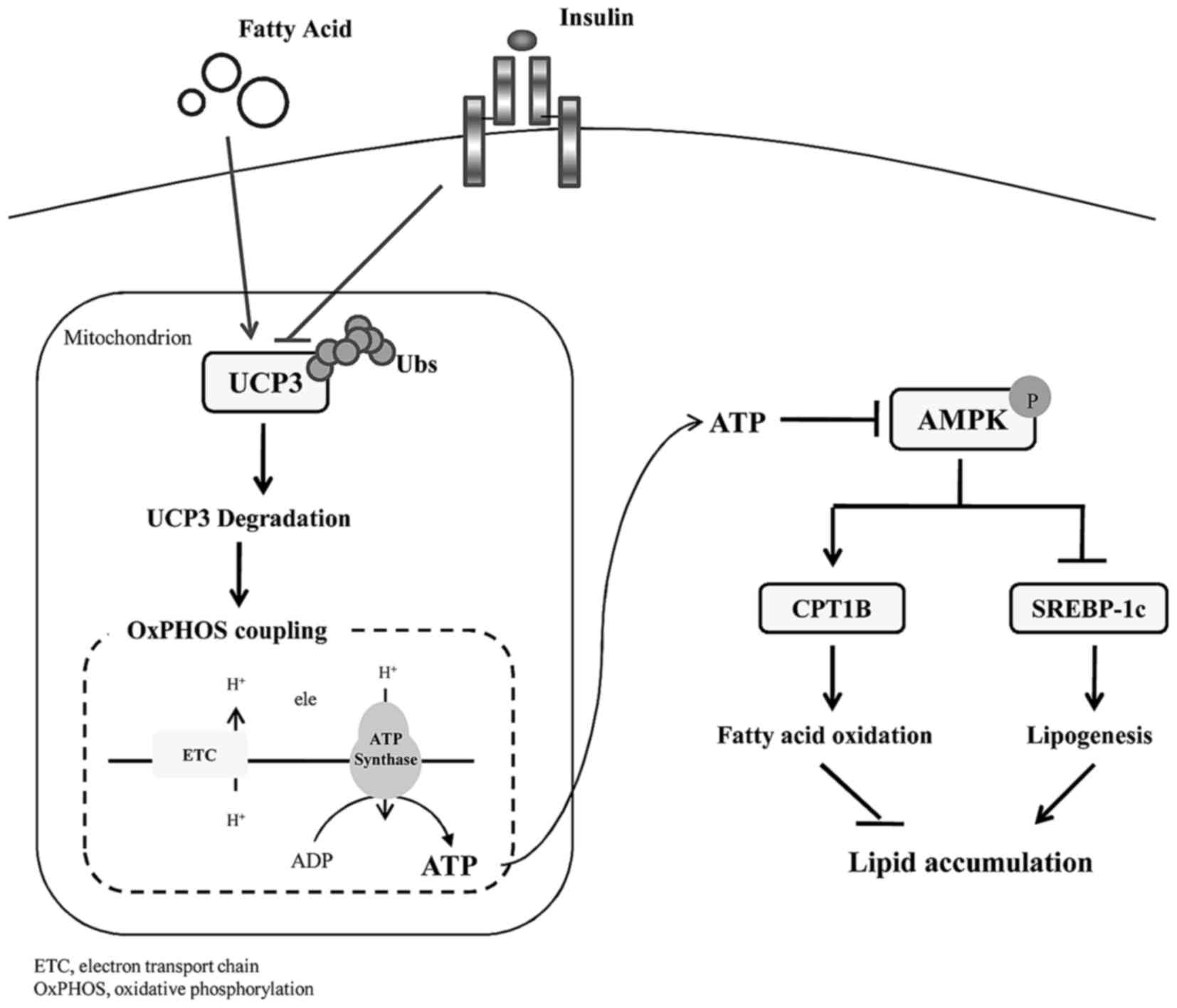|
1
|
Guariguata L, Whiting DR, Hambleton I,
Beagley J, Linnenkamp U and Shaw JE: Global estimates of diabetes
prevalence for 2013 and projections for 2035. Diabetes Res Clin
Pract. 103:137–149. 2014. View Article : Google Scholar : PubMed/NCBI
|
|
2
|
Kramer CK, Zinman B and Retnakaran R:
Short-term intensive insulin therapy in type 2 diabetes mellitus: A
systematic review and meta-analysis. Lancet Diabetes Endocrinol.
1:28–34. 2013. View Article : Google Scholar
|
|
3
|
Hu Y, Li L, Xu Y, Yu T, Tong G, Huang H,
Bi Y, Weng J and Zhu D: Short-term intensive therapy in newly
diagnosed type 2 diabetes partially restores both insulin
sensitivity and β-cell function in subjects with long-term
remission. Diabetes Care. 34:1848–1853. 2011. View Article : Google Scholar : PubMed/NCBI
|
|
4
|
Weng J, Li Y, Xu W, Shi L, Zhang Q, Zhu D,
Hu Y, Zhou Z, Yan X, Tian H, et al: Effect of intensive insulin
therapy on beta-cell function and glycaemic control in patients
with newly diagnosed type 2 diabetes: A multicentre randomised
parallel-group trial. Lancet. 371:1753–1760. 2008. View Article : Google Scholar : PubMed/NCBI
|
|
5
|
Samuel VT, Petersen KF and Shulman GI:
Lipid-induced insulin resistance: Unravelling the mechanism.
Lancet. 375:2267–2277. 2010. View Article : Google Scholar : PubMed/NCBI
|
|
6
|
Shulman GI, Rothman DL, Jue T, Stein P,
DeFronzo RA and Shulman RG: Quantitation of muscle glycogen
synthesis in normal subjects and subjects with
non-insulin-dependent diabetes by 13C nuclear magnetic resonance
spectroscopy. N Engl J Med. 322:223–228. 1990. View Article : Google Scholar : PubMed/NCBI
|
|
7
|
Eckardt K, Taube A and Eckel J:
Obesity-associated insulin resistance in skeletal muscle: Role of
lipid accumulation and physical inactivity. Rev Endocr Metab
Disord. 12:163–172. 2011. View Article : Google Scholar : PubMed/NCBI
|
|
8
|
Itani SI, Ruderman NB, Schmieder F and
Boden G: Lipid-induced insulin resistance in human muscle is
associated with changes in diacylglycerol, protein kinase C, and
IkappaB-alpha. Diabetes. 51:2005–2011. 2002. View Article : Google Scholar : PubMed/NCBI
|
|
9
|
Samuel VT and Shulman GI: Mechanisms for
insulin resistance: Common threads and missing links. Cell.
148:852–871. 2012. View Article : Google Scholar : PubMed/NCBI
|
|
10
|
Guillet-Deniau I, Mieulet V, Le Lay S,
Achouri Y, Carré D, Girard J, Foufelle F and Ferré P: Sterol
regulatory element binding protein-1c expression and action in rat
muscles: Insulin-like effects on the control of glycolytic and
lipogenic enzymes and UCP3 gene expression. Diabetes. 51:1722–1728.
2002. View Article : Google Scholar : PubMed/NCBI
|
|
11
|
Guillet-Deniau I, Pichard AL, Koné A,
Esnous C, Nieruchalski M, Girard J and Prip-Buus C: Glucose induces
de novo lipogenesis in rat muscle satellite cells through a
sterol-regulatory-element-binding-protein-1c-dependent pathway. J
Cell Sci. 117:1937–1944. 2004. View Article : Google Scholar : PubMed/NCBI
|
|
12
|
Tsintzas K, Jewell K, Kamran M, Laithwaite
D, Boonsong T, Littlewood J, Macdonald I and Bennett A:
Differential regulation of metabolic genes in skeletal muscle
during starvation and refeeding in humans. J Physiol. 575:291–303.
2006. View Article : Google Scholar : PubMed/NCBI
|
|
13
|
Bruce CR, Anderson MJ, Carey AL, Newman
DG, Bonen A, Kriketos AD, Cooney GJ and Hawley JA: Muscle oxidative
capacity is a better predictor of insulin sensitivity than lipid
status. J Clin Endocrinol Metab. 88:5444–5451. 2003. View Article : Google Scholar : PubMed/NCBI
|
|
14
|
Kim JY, Hickner RC, Cortright RL, Dohm GL
and Houmard JA: Lipid oxidation is reduced in obese human skeletal
muscle. Am J Physiol Endocrinol Metab. 279:E1039–E1044.
2000.PubMed/NCBI
|
|
15
|
Ukropcova B, Sereda O, de Jonge L, Bogacka
I, Nguyen T, Xie H, Bray GA and Smith SR: Family history of
diabetes links impaired substrate switching and reduced
mitochondrial content in skeletal muscle. Diabetes. 56:720–727.
2007. View Article : Google Scholar : PubMed/NCBI
|
|
16
|
Li Y, Xu S, Mihaylova MM, Zheng B, Hou X,
Jiang B, Park O, Luo Z, Lefai E, Shyy JY, et al: AMPK
phosphorylates and inhibits SREBP activity to attenuate hepatic
steatosis and atherosclerosis in diet-induced insulin-resistant
mice. Cell Metab. 13:376–388. 2011. View Article : Google Scholar : PubMed/NCBI
|
|
17
|
Ronnett GV, Kleman AM, Kim EK, Landree LE
and Tu Y: Fatty acid metabolism, the central nervous system, and
feeding. Obesity (Silver Spring). 14(Suppl 5): 201S–207S. 2006.
View Article : Google Scholar
|
|
18
|
Kjøbsted R, Pedersen AJ, Hingst JR,
Sabaratnam R, Birk JB, Kristensen JM, Højlund K and Wojtaszewski
JF: Intact regulation of the AMPK signaling network in response to
exercise and insulin in skeletal muscle of male patients with type
2 diabetes: Illumination of AMPK activation in recovery from
exercise. Diabetes. 65:1219–1230. 2016. View Article : Google Scholar : PubMed/NCBI
|
|
19
|
Tang S, Wu W, Tang W, Ge Z, Wang H, Hong
T, Zhu D and Bi Y: Suppression of Rho-kinase 1 is responsible for
insulin regulation of the AMPK/SREBP-1c pathway in skeletal muscle
cells exposed to palmitate. Acta Diabetol. Mar 7–2017.Epub ahead of
print. View Article : Google Scholar
|
|
20
|
Saltiel AR: New therapeutic approaches for
the treatment of obesity. Sci Transl Med. 8:323rv22016. View Article : Google Scholar : PubMed/NCBI
|
|
21
|
Busiello RA, Savarese S and Lombardi A:
Mitochondrial uncoupling proteins and energy metabolism. Front
Physiol. 6:362015. View Article : Google Scholar : PubMed/NCBI
|
|
22
|
Krook A, Digby J, O'Rahilly S, Zierath JR
and Wallberg-Henriksson H: Uncoupling protein 3 is reduced in
skeletal muscle of NIDDM patients. Diabetes. 47:1528–1531. 1998.
View Article : Google Scholar : PubMed/NCBI
|
|
23
|
Mensink M, Hesselink MK, Borghouts LB,
Keizer H, Moonen-Kornips E, Schaart G, Blaak EE and Schrauwen P:
Skeletal muscle uncoupling protein-3 restores upon intervention in
the prediabetic and diabetic state: Implications for diabetes
pathogenesis? Diabetes Obes Metab. 9:594–596. 2007. View Article : Google Scholar : PubMed/NCBI
|
|
24
|
Schrauwen P, Hesselink MK, Blaak EE,
Borghouts LB, Schaart G, Saris WH and Keizer HA: Uncoupling protein
3 content is decreased in skeletal muscle of patients with type 2
diabetes. Diabetes. 50:2870–2873. 2001. View Article : Google Scholar : PubMed/NCBI
|
|
25
|
Clapham JC, Arch JR, Chapman H, Haynes A,
Lister C, Moore GB, Piercy V, Carter SA, Lehner I, Smith SA, et al:
Mice overexpressing human uncoupling protein-3 in skeletal muscle
are hyperphagic and lean. Nature. 406:415–418. 2000. View Article : Google Scholar : PubMed/NCBI
|
|
26
|
Costford SR, Chaudhry SN, Salkhordeh M and
Harper ME: Effects of the presence, absence, and overexpression of
uncoupling protein-3 on adiposity and fuel metabolism in congenic
mice. Am J Physiol Endocrinol Metab. 290:E1304–E1312. 2006.
View Article : Google Scholar : PubMed/NCBI
|
|
27
|
Son C, Hosoda K, Ishihara K, Bevilacqua L,
Masuzaki H, Fushiki T, Harper ME and Nakao K: Reduction of
diet-induced obesity in transgenic mice overexpressing uncoupling
protein 3 in skeletal muscle. Diabetologia. 47:47–54. 2004.
View Article : Google Scholar
|
|
28
|
Petersen KF, Dufour S and Shulman GI:
Decreased insulin-stimulated ATP synthesis and phosphate transport
in muscle of insulin-resistant offspring of type 2 diabetic
parents. PLoS Med. 2:e2332005. View Article : Google Scholar : PubMed/NCBI
|
|
29
|
Stump CS, Short KR, Bigelow ML, Schimke JM
and Nair KS: Effect of insulin on human skeletal muscle
mitochondrial ATP production, protein synthesis, and mRNA
transcripts. Proc Natl Acad Sci USA. 100:7996–8001. 2003.
View Article : Google Scholar : PubMed/NCBI
|
|
30
|
Bi Y, Cai M, Liang H, Sun W, Li X, Wang C,
Zhu Y, Chen X, Li M and Weng J: Increased carnitine palmitoyl
transferase 1 expression and decreased sterol regulatory
element-binding protein 1c expression are associated with reduced
intramuscular triglyceride accumulation after insulin therapy in
high-fat-diet and streptozotocin-induced diabetic rats. Metabolism.
58:779–786. 2009. View Article : Google Scholar : PubMed/NCBI
|
|
31
|
Bi Y, Wu W, Shi J, Liang H, Yin W, Chen Y,
Tang S, Cao S, Cai M, Shen S, et al: Role for sterol regulatory
element binding protein-1c activation in mediating skeletal muscle
insulin resistance via repression of rat insulin receptor
substrate-1 transcription. Diabetologia. 57:592–602. 2014.
View Article : Google Scholar
|
|
32
|
Xie B, Chen Q, Chen L, Sheng Y, Wang HY
and Chen S: The Inactivation of RabGAP function of AS160 promotes
lysosomal degradation of GLUT4 and causes postprandial
hyperglycemia and hyperinsulinemia. Diabetes. 65:3327–3340. 2016.
View Article : Google Scholar : PubMed/NCBI
|
|
33
|
Livak KJ and Schmittgen TD: Analysis of
relative gene expression data using real-time quantitative PCR and
the 2(−Delta Delta C(T)) method. Methods. 25:402–408. 2001.
View Article : Google Scholar
|
|
34
|
Bhatt DP, Chen X, Geiger JD and
Rosenberger TA: A sensitive HPLC-based method to quantify adenine
nucleotides in primary astrocyte cell cultures. J Chromatogr B
Analyt Technol Biomed Life Sci. 889–890:110–115. 2012. View Article : Google Scholar
|
|
35
|
Azzu V, Mookerjee SA and Brand MD: Rapid
turnover of mitochondrial uncoupling protein 3. Biochem J.
426:13–17. 2010. View Article : Google Scholar
|
|
36
|
Mookerjee SA and Brand MD: Characteristics
of the turnover of uncoupling protein 3 by the ubiquitin proteasome
system in isolated mitochondria. Biochim Biophys Acta.
1807:1474–1481. 2011. View Article : Google Scholar : PubMed/NCBI
|
|
37
|
Bi Y, Sun WP, Chen X, Li M, Liang H, Cai
MY, Zhu YH, He XY, Xu F and Weng JP: Effect of early insulin
therapy on nuclear factor kappaB and cytokine gene expressions in
the liver and skeletal muscle of high-fat diet,
streptozotocin-treated diabetic rats. Acta Diabetol. 45:167–178.
2008. View Article : Google Scholar : PubMed/NCBI
|
|
38
|
Pagel-Langenickel I, Bao J, Pang L and
Sack MN: The role of mitochondria in the pathophysiology of
skeletal muscle insulin resistance. Endocr Rev. 31:25–51. 2010.
View Article : Google Scholar :
|
|
39
|
Szendroedi J, Phielix E and Roden M: The
role of mitochondria in insulin resistance and type 2 diabetes
mellitus. Nat Rev Endocrinol. 8:92–103. 2011. View Article : Google Scholar : PubMed/NCBI
|
|
40
|
Zhang Y and Ye J: Mitochondrial inhibitor
as a new class of insulin sensitizer. Acta Pharm Sin B. 2:341–349.
2012. View Article : Google Scholar
|
|
41
|
Bridges HR, Jones AJ, Pollak MN and Hirst
J: Effects of metformin and other biguanides on oxidative
phosphorylation in mitochondria. Biochem J. 462:475–487. 2014.
View Article : Google Scholar : PubMed/NCBI
|
|
42
|
Foretz M, Hébrard S, Leclerc J,
Zarrinpashneh E, Soty M, Mithieux G, Sakamoto K, Andreelli F and
Viollet B: Metformin inhibits hepatic gluconeogenesis in mice
independently of the LKB1/AMPK pathway via a decrease in hepatic
energy state. J Clin Invest. 120:2355–2369. 2010. View Article : Google Scholar : PubMed/NCBI
|
|
43
|
Owen MR, Doran E and Halestrap AP:
Evidence that metformin exerts its anti-diabetic effects through
inhibition of complex 1 of the mitochondrial respiratory chain.
Biochem J. 348:607–614. 2000. View Article : Google Scholar : PubMed/NCBI
|
|
44
|
Turner N, Li JY, Gosby A, To SW, Cheng Z,
Miyoshi H, Taketo MM, Cooney GJ, Kraegen EW, James DE, et al:
Berberine and its more biologically available derivative,
dihydroberberine, inhibit mitochondrial respiratory complex I: A
mechanism for the action of berberine to activate AMP-activated
protein kinase and improve insulin action. Diabetes. 57:1414–1418.
2008. View Article : Google Scholar : PubMed/NCBI
|
|
45
|
Xia X, Yan J, Shen Y, Tang K, Yin J, Zhang
Y, Yang D, Liang H, Ye J and Weng J: Berberine improves glucose
metabolism in diabetic rats by inhibition of hepatic
gluconeogenesis. PLoS One. 6:e165562011. View Article : Google Scholar : PubMed/NCBI
|
|
46
|
Gledhill JR, Montgomery MG, Leslie AG and
Walker JE: Mechanism of inhibition of bovine F1-ATPase by
resveratrol and related polyphenols. Proc Natl Acad Sci USA.
104:13632–13637. 2007. View Article : Google Scholar : PubMed/NCBI
|
|
47
|
Szendroedi J, Schmid AI, Chmelik M, Toth
C, Brehm A, Krssak M, Nowotny P, Wolzt M, Waldhausl W and Roden M:
Muscle mitochondrial ATP synthesis and glucose
transport/phosphorylation in type 2 diabetes. PLoS Med. 4:e1542007.
View Article : Google Scholar : PubMed/NCBI
|
|
48
|
Sreekumar R, Halvatsiotis P, Schimke JC
and Nair KS: Gene expression profile in skeletal muscle of type 2
diabetes and the effect of insulin treatment. Diabetes.
51:1913–1920. 2002. View Article : Google Scholar : PubMed/NCBI
|
|
49
|
Retnakaran R and Zinman B: Short-term
intensified insulin treatment in type 2 diabetes: Long-term effects
on β-cell function. Diabetes Obes Metab. 14(Suppl 3): 161–166.
2012. View Article : Google Scholar
|
|
50
|
Parascandola J: Dinitrophenol and
bioenergetics: An historical perspective. Mol Cell Biochem.
5:69–77. 1974. View Article : Google Scholar : PubMed/NCBI
|
|
51
|
Perry RJ, Kim T, Zhang XM, Lee HY, Pesta
D, Popov VB, Zhang D, Rahimi Y, Jurczak MJ, Cline GW, et al:
Reversal of hypertriglyceridemia, fatty liver disease, and insulin
resistance by a liver-targeted mitochondrial uncoupler. Cell Metab.
18:740–748. 2013. View Article : Google Scholar : PubMed/NCBI
|
|
52
|
Tao H, Zhang Y, Zeng X, Shulman GI and Jin
S: Niclosamide ethanolamine-induced mild mitochondrial uncoupling
improves diabetic symptoms in mice. Nat Med. 20:1263–1269. 2014.
View Article : Google Scholar : PubMed/NCBI
|
|
53
|
Ligeret H, Barthélémy S, Bouchard Doulakas
G, Carrupt PA, Tillement JP, Labidalle S and Morin D: Fluoride
curcumin derivatives: New mitochondrial uncoupling agents. FEBS
Lett. 569:37–42. 2004. View Article : Google Scholar : PubMed/NCBI
|
|
54
|
Lim HW, Lim HY and Wong KP: Uncoupling of
oxidative phosphorylation by curcumin: Implication of its cellular
mechanism of action. Biochem Biophys Res Commun. 389:187–192. 2009.
View Article : Google Scholar : PubMed/NCBI
|















